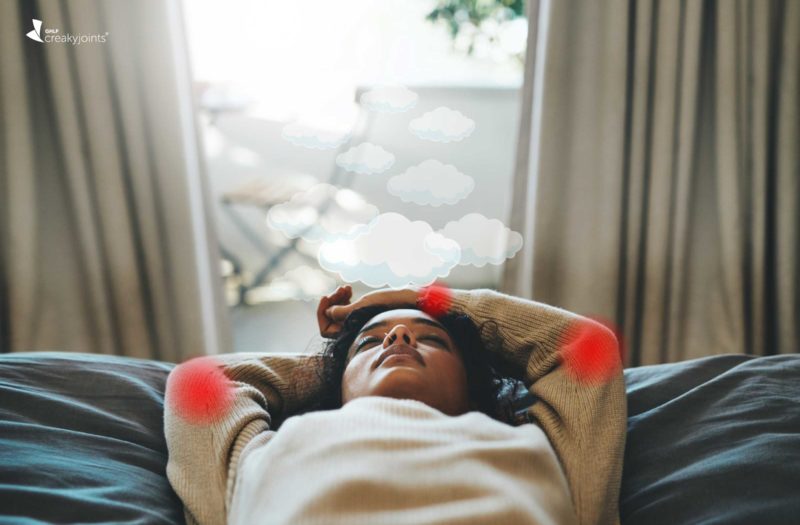Key Takeaways
- Sleep disturbances and fatigue common post-COVID symptoms, especially among Black patients as well as those with high BMI or anxiety disorders.
- More research needed to further understand race-specific determinants of sleep disturbances in order to develop interventions.
- If you believe you’re experiencing insomnia related to COVID-19, it’s important to bring it up to your doctor.
Sleep disturbances and lingering fatigue are common in patients who recover from COVID-19 — and race, obesity, and mood disorders are contributors, per a new study presented at the annual meeting of the Associated Professional Sleep Societies.
Investigators analyzed data on 962 patients from the Cleveland Clinic ReCOVer Clinic between February 2021 and April 2022. These patients had recovered from COVID-19 and completed questionnaires on sleep disturbance and fatigue.
When it came to fatigue, the researchers found that:
- 67.2% of patients reported at least moderate fatigue
- 21.8% of patients reported severe fatigue
When it came to sleep disturbances, they found that:
- 41.3% of patients reported at least moderate sleep disturbances
- 8% of patients reported severe sleep disturbances
Patients with moderate-to-severe sleep disturbances (compared with normal-to-mild sleep disturbances) had higher body mass indexes, had worse general anxiety disorder, and were more likely to be Black. In fact, after adjusting for demographics, the researchers found that Black patients were three times more likely to experience moderate-to-severe sleep disturbances.
“Sleep difficulties are highly prevalent and debilitating symptoms reported in patients with post-acute sequelae of COVID-19,” said Cinthya Pena Orbea, MD, a sleep specialist at Cleveland Clinic and lead author of the study, in a statement. “Our study suggests that the prevalence of moderate to severe sleep disturbances is high and that Black race confers increased odds to suffer from moderate to severe sleep disturbances, highlighting the importance to further understand race-specific determinants of sleep disturbances in order to develop race-specific interventions.”
It is unclear how long after COVID-19 fatigue and sleep problems last — and researchers are still learning more about the effects of long COVID. Many patients have experienced a double-whammy of COVID-somnia and painsomnia during the pandemic, which can cause significant sleep disturbances.
If you believe you’re experiencing insomnia related to COVID-19 or anything else, it’s important to talk to your doctor, who may recommend cognitive behavioral therapy, light therapy, melatonin, or a mixture of methods to help improve your sleep, per the Cleveland Clinic.
There are also a number of things you can do at home to improve your sleep hygiene. According to UC Davis Health, strategies for better sleep include:
- Keeping a normal daily routine. Have set wake-up and sleep times — avoid sleeping in or staying up late.
- Create a bedtime routine. This may involve turning down the lights a half hour before you go to sleep and doing other routine tasks to slow down (like reading or journaling, stretching, etc.).
- Avoid using your bedroom as your office. If you don’t have another space to work in (if you work from home), at least try not to work in bed. Your brain needs to associate your bed with being a place of rest.
- Exercise during the day. This keeps your body in its normal rhythm and reduces stress. Aim to finish a few hours before bedtime to give yourself the chance to cool and slow down.
- Don’t eat dinner late. Have your last meal at least four hours before you head to bed.
- Cut back on news and social media at night. It may be tempting to scroll before bed, but the constant news alerts and headlines can set off alarms in your brain that disrupt sleep.
For more sleep advice, here are 18 tips that arthritis patients swear by for getting a better night’s sleep.
Be Part of Research with ArthritisPower
Join CreakyJoints’ patient-centered research registry and participate in voluntary studies about managing arthritis. Learn more and sign up here.
Can COVID-19 Cause Insomnia and Other Sleep Problems? Cleveland Clinic. May 11, 2022. https://health.clevelandclinic.org/covid-insomnia/.
COVID-19 is wrecking our sleep with coronasomnia – tips to fight back. UC Davis Health. September 23, 2020. https://health.ucdavis.edu/news/headlines/covid-19-is-wrecking-our-sleep-with-coronasomnia–tips-to-fight-back-/2020/09.
Pena Orbea C, et al. 0735 Sleep Disturbances in Post-Acute Sequelae of COVID-19 (PASC). Sleep. May 25, 2022. https://doi.org/10.1093/sleep/zsac079.731.






